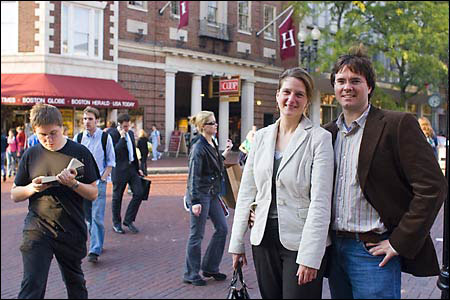HERC’s Web site a boon to job-seeking academics

The academic job search has just taken a quantum leap. A database with thousands of faculty and staff jobs at 35 institutions of higher education and affiliated teaching hospitals is now available online at http://www.newenglandherc.org. The database was launched Monday (Oct. 2) by the New England Higher Education Recruitment Consortium (New England HERC), whose aim is to improve member institutions’ recruitment and diversity efforts for both faculty and staff with a particular focus on assisting dual-career couples by helping to find suitable employment for spouses and partners at academic institutions in the same region.
Dual-career couples are becoming more numerous in academia; studies have shown that 80 percent of faculty members have spouses or partners who are working professionals. Thirty-five percent of male faculty and 40 percent of female faculty are partnered with scholars who are faculty members. And to afford the cost of living in the New England area, a dual income is often necessary.
New England HERC’s Web site, which is free for job seekers, is one-stop shopping for job openings and relocation resources, making it one of the most comprehensive dual-career resources available. Couples can link their profiles and get jobs matching both sets of criteria. They can also search for local schools for their children, find child-care centers, and read about local culture. In addition to faculty positions, the Web site also posts medical and staff positions.
“The New England HERC is an innovation to help address the needs of dual-career couples during the faculty recruitment process,” said Evelynn Hammonds, senior vice provost for faculty development and diversity at Harvard, the host institution for the New England HERC. “As many deans who work on these issues at institutions throughout the country would say, we’re no longer recruiting individuals, we’re recruiting families. When university recruitment efforts fail, the spouse’s situation is the most often-cited reason. It’s important that we address this issue.”
New England HERC’s search engine allows prospective employees to search for jobs by region, job type, or institution. Hammonds hopes that “by responding to the needs of couples in which both partners are highly qualified academic professionals, HERC will help support diversity in faculty recruiting.” Over the past 15 years, a number of studies have identified numerous benefits to developing a diverse university faculty and staff.
“By joining HERC, member institutions are reinvesting in themselves,” said Jacqueline Hogan, director of New England HERC. “This consortium represents a creative business model in which members exchange information and best practices and, by pooling their resources, [save] on advertising and recruitment costs.”
“Historically, universities have competed with each other for top talent,” said Lotte Bailyn, a professor of management at the Massachusetts Institute of Technology’s (MIT) Sloan School of Management and co-director of the MIT Workplace Center. “The reality is that as a region, we are much stronger if we work together to address these recruitment challenges.”
Members can use New England HERC’s Web site as often as they like and fill positions for a fraction of the cost that hiring agencies and other online job boards charge, Hogan said.
“When they join HERC, our member institutions get unlimited access to posting faculty and staff jobs, and increased opportunity to broaden their applicant pool with very little effort,” said Hogan. “While a typical search agency fee can range from $10,000 and $15,000 to fill a position, membership in New England HERC pays for itself with one placement from the Web site per year, and smaller institutions can take advantage of the membership benefits for a reduced fee,” she said.
HERC was pioneered in Northern California by the University of California, Stanford, and other schools. Southern California and New Jersey have since replicated the model, and HERCs are currently planned for Metro New York/Southern Connecticut, Upstate New York, and Chicago. A national HERC is also in development.




